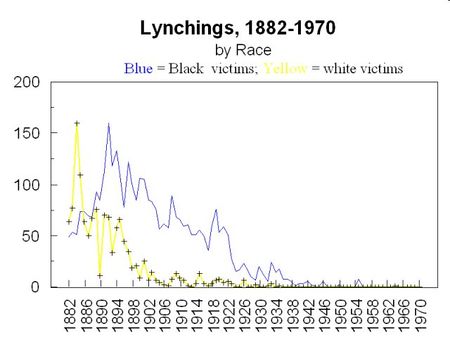Difference between revisions of "Lynching"
| Line 6: | Line 6: | ||
At the turn of the 20th century, southern states passed new constitutions or [[Jim Crow]] laws which effectively disenfranchised most blacks and established [[segregation]] of public facilities by race/ Nearly 3,500 Blacks and 1,300 [[white]]s were lynched between 1882 and 1968.<ref>[http://www.law.umkc.edu/faculty/projects/ftrials/shipp/lynchingsstate.html Lynchings: By State and Race, 1882–1968.] Statistics provided by the Archives at Tuskegee Institute. University of Missouri-Kansas City School of Law. [https://web.archive.org/web/20100629081241/http://www.law.umkc.edu/faculty/projects/ftrials/shipp/lynchingsstate.html]</ref> | At the turn of the 20th century, southern states passed new constitutions or [[Jim Crow]] laws which effectively disenfranchised most blacks and established [[segregation]] of public facilities by race/ Nearly 3,500 Blacks and 1,300 [[white]]s were lynched between 1882 and 1968.<ref>[http://www.law.umkc.edu/faculty/projects/ftrials/shipp/lynchingsstate.html Lynchings: By State and Race, 1882–1968.] Statistics provided by the Archives at Tuskegee Institute. University of Missouri-Kansas City School of Law. [https://web.archive.org/web/20100629081241/http://www.law.umkc.edu/faculty/projects/ftrials/shipp/lynchingsstate.html]</ref> | ||
| − | Former [[Supreme Court]] Justice [[James F. Byrnes]], appointed by [[Franklin Roosevelt]] and later [[Secretary of State]] under President [[Harry Truman]] said, "[[rape]] is responsible, directly and indirectly, for most of the lynching in America."<ref>https://segregationinamerica.eji.org/report/segregation-forever-leaders.html</ref> | + | Former [[Supreme Court]] Justice [[James F. Byrnes]], appointed by [[Franklin Roosevelt]] and later [[Secretary of State]] under President [[Harry Truman]] said, "[[rape]] is responsible, directly and indirectly, for most of the lynching in America."<ref>https://segregationinamerica.eji.org/report/segregation-forever-leaders.html</ref> Franklin Roosevelt appointed [[Ku Klux Klan]] Grand Wizard [[Hugo Black]] to the Supreme Court. Franklin Roosevelt always opposed Republican civil rights bills and anti-lynching legislation. |
==See also== | ==See also== | ||
Revision as of 13:35, September 10, 2020

Source: Historical Statistics of the U.S., and is based on the 1952 Negro year Book.
Lynching refers to the assumption of extrajudicial authority, usually by Democrats, and the fatal execution of minorities or political opponents by mob rule.
Lynching attacks on African Americans, especially in the South, increased dramatically in the aftermath of Reconstruction, after the Republicans abolished slavery and extended Freedmen the right to vote. The peak of lynchings occurred in 1892, after white Southern Democrats regained control of state legislatures.

At the turn of the 20th century, southern states passed new constitutions or Jim Crow laws which effectively disenfranchised most blacks and established segregation of public facilities by race/ Nearly 3,500 Blacks and 1,300 whites were lynched between 1882 and 1968.[2]
Former Supreme Court Justice James F. Byrnes, appointed by Franklin Roosevelt and later Secretary of State under President Harry Truman said, "rape is responsible, directly and indirectly, for most of the lynching in America."[3] Franklin Roosevelt appointed Ku Klux Klan Grand Wizard Hugo Black to the Supreme Court. Franklin Roosevelt always opposed Republican civil rights bills and anti-lynching legislation.
See also
References
- ↑ Hubbs, Guy W. (May 15, 2015). "Searching for Freedom after the Civil War: Klansman, Carpetbagger, Scalawag, and Freedman". University Alabama Press.
- ↑ Lynchings: By State and Race, 1882–1968. Statistics provided by the Archives at Tuskegee Institute. University of Missouri-Kansas City School of Law. [1]
- ↑ https://segregationinamerica.eji.org/report/segregation-forever-leaders.html